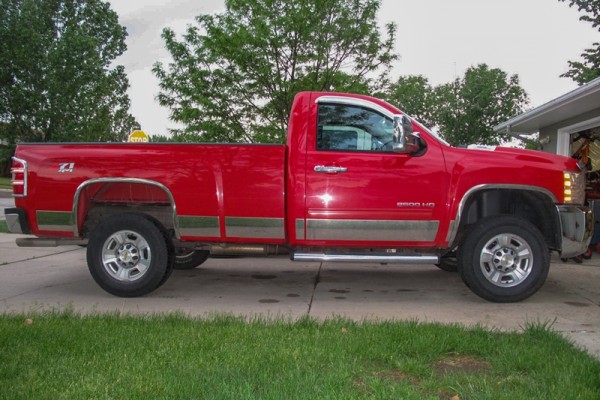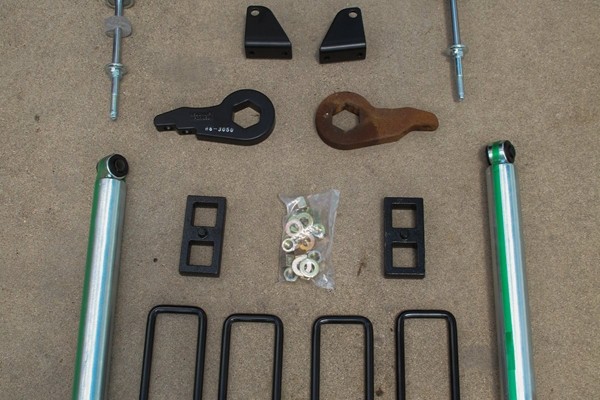Sometimes you don’t need a full-on suspension lift kit for your truck. Maybe you want to retain your truck’s towing abilities, keep a reasonable step-in height, or just don’t have the budget for a big lift kit and the domino-effect of larger tires/new rims/re-geared differentials that big lifts can create. That’s the situation we were in with this 2010 Chevy Silverado 2500HD. We wanted the ability to run a slightly larger tire and set our truck apart from the 2WD GMs without breaking the bank, and we did not want to sacrifice our towing ability.
Fortunately ReadyLift had what we needed and we were able to install the parts in the driveway in an afternoon.
Ford and Dodge heavy duty trucks (three quarter and one ton) use a solid front axles and coil springs. These are easy to level with coil spacers, which ReadyLift offers for both trucks. The independent front suspension on this Chevy uses torsion bars for the front suspension. “Wait,” you might be thinking, “can’t I just crank the preload on the front torsion bars to level out my truck?” While you indeed can do this, ReadyLift torsion keys are a much more elegant solution and offer a better ride at a very reasonable price. Instead of twisting the torsion bars more to gain ground clearance, ReadyLift torsion bar keys are clocked to increase the ride height with the torsion bar in the factory position. This means that the spring rate and downtravel are not adversely affected, as they are when you “crank” the stock torsion bars.
ReadyLift isn’t the only company that makes these torsion keys, but there are some details that make their products stand out from others on the market. For starters, ReadyLift torsion keys are forged, not case, which makes them considerably stronger with tighter tolerances. They also include 10.9 grade metric hardware and shock extensions to allow for full suspension travel with the factory shocks. After 100,000 miles, we weren’t interested in retaining our factory shocks, but the ReadyLift brackets did allow us to source stock length Rancho shocks. We picked the RS7000MT monotube shock for its strong rebound characteristics. These are nitrogen-charged monotube shocks that have similar compression damping to the stock shocks for a smooth ride, but the increased rebound helps control our heavy truck and larger than stock tires.
If you just want a level stance for your truck, these parts are all that you need. ReadyLift makes components for the rear suspension on our Silverado too, with blocks available to raise the rear of the truck 1-inch or 2-inches. We chose the 1-inch block as a happy compromise between a level stance when the truck is unladen and when we are towing. As with the front, the lift was complemented with Rancho RS7000MT shocks with brushed aluminum bodies that help control suspension movement and quickly dissipate heat.
Both ReadyLift and Rancho offer lifetime warranties on their products as well, which speaks volumes about their confidence in the quality of their products. ReadyLift has sold over 60,000 of their forged torsion keys without a failure. And if you don’t drive a Chevy, don’t worry. Rancho and ReadyLift offer shocks and leveling kits for nearly every truck out there, whether you are a Dodge or Ford guy or drive a Toyota or Nissan.













This is a great ReadyLift ad, but everything you say about the torsion keys is false. Keys or “crank” do EXACTLY the same thing, which is twist the torsion bar for more ride height. That doesn’t make the suspension stiffer, but it does effectively reduce droop travel by however much you lift it. What saves the ride quality is the taller lower shock brackets that restore some of the lost droop travel. Most of these trucks have enough thread on the OE torsion bar keys to go another 1″ to 1.5″ in height, so if that’s enough, it’s way easier and cheaper to just buy the extended lower shock mounts, or use shocks for a 2″ lifted truck if you’re replacing them anyway. If you’re after more lift than that, or have a lot of heavy stuff on the front, then you may need the keys to get there, but the keys have nothing to do with ride quality when compared against “cranking” the bars. Just want to stop this bad information when I can…
We agree that the results between “cranking” the factory torsion bar and installing a torsion bar key are similar, but there are advantages to the torsion bar keys, as pointed out in the article. Also, details such as the forged construction and 10.9 hardware make the ReadyLift keys stronger that the stock components.